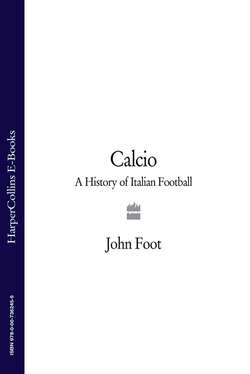Читать книгу Calcio: A History of Italian Football - John Foot - Страница 51
Fair Play? Luciano Gaucci and Jay Bothroyd, Perugia 2004
Оглавление‘A country like ours, which lacks the culture of fair play’
PIERLUIGI PAIRETTO, referee
Former Arsenal youth player Jay Bothroyd joined Perugia on a free transfer from Coventry City in the 2002–2003 close season. The young striker started well, scoring goals in the UEFA Cup and in the league, but drifted in and out of the first team as Perugia failed to win any of their first twenty league games. Perugia’s large and loud president Luciano Gaucci blamed this terrible run on the referees and the football authorities. He claimed that the powers that be were out to destroy Perugia after a series of costly legal battles with the federation.
Gaucci was, as usual, over-the-top in his shrill protests, using conspiracy theories as a convenient excuse for his failure to build a team strong enough to stay up. In late 2003, Gaucci even threatened to take the football authorities into the civil courts, and have them charged with ‘sporting fraud’. He prepared a dossier of the decisions that had supposedly gone against Perugia and a video which was to be used in evidence. Such a move was unprecedented in footballing history, and Gaucci pulled back from an immediate confrontation, promising that the case would be brought at the end of the season.30 The case was never filed. Gaucci knew that his team risked massive points deductions and even automatic relegation if they went to the courts.
Amazingly it is also possible that Gaucci was not entirely wrong. His arrogant court campaigns over the summer of 2003 had annoyed many influential people in the game. Gaucci’s shrill claims were also a kind of self-fulfilling prophecy. By arguing that there was a conspiracy against Perugia, he helped to create a conspiracy against Perugia. A ‘war with the palazzo’ (code in Italy for a ‘battle against the powers that be’) could only damage his club. This happened with Gianni Rivera and Milan in the 1970s, when the great midfielder was banned for weeks after making this statement: ‘they don’t want us to win the championship, it’s the third time in a row that the referees have stolen it from us’. History repeated itself with Roma in the 2002–2003 season. Roma president Franco Sensi spent the whole season complaining about conspiracies and bad decisions. The result? A series of bad decisions and a terrible season for Roma. None of this can be proved, of course, but the trend was for referees and their peers to punish those who ‘protested too much’. The history of Italian football has shown, time and time again, that those who complain about plots against them only reinforce a kind of corporate hostility.
Perugia were not exactly setting standards in other areas. In January 2004, they were at home to Roma. In the second half, with Roma 1–0 up, Bothroyd burst into the penalty area between two Roma central defenders, one of whom clearly held him across the chest. Bothroyd tried to stay on his feet but he was unbalanced and his shot was weak. No penalty was given. Manager Serse Cosmi went crazy near the bench, not for the first time. Strangely, the target of his ranting was not the referee, but Bothroyd. ‘Go down, go down, why didn’t you go down,’ he screamed. Later, Cosmi repeated his comments, and added that ‘Bothroyd should have gone to ground. Then the referee would have given a penalty.’ Was Cosmi therefore angry with the ‘fair’ Englishman because he hadn’t dived? The reality was more complex. Bothroyd should have ‘allowed himself to fall’ so as to ‘make the referee’s decision inevitable’. His ‘not falling’ had led the referee to make an error. Cosmi was bitter about the praise for Bothroyd’s desire not to sprawl in the area. ‘I expect they will build a monument to him,’ he quipped, bitterly, and added that only the ‘professional moralists’ had criticized his stance. Cosmi had spoken to Bothroyd afterwards, telling him that a player should ‘stay on his feet’ in such cases ‘only if he is sure that he will score. He should have gone down. It was a clear penalty.’ Cosmi went further, in a post-match interview. Bothroyd had been ‘naïve’ to not go down in the area. ‘A normal player, not a diver, falls down in that kind of situation. There are lots of campaigns against divers, let’s have one against heroes as well.’ No wonder the task of referees was so difficult in Italy, if such things were said openly, and almost with pride, by some of the leading figures in the game.
